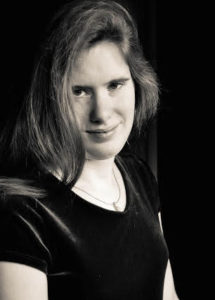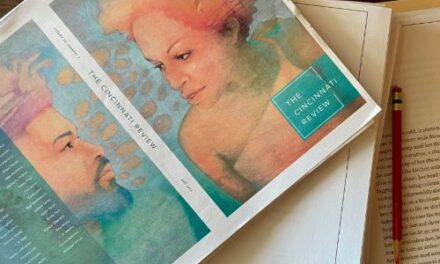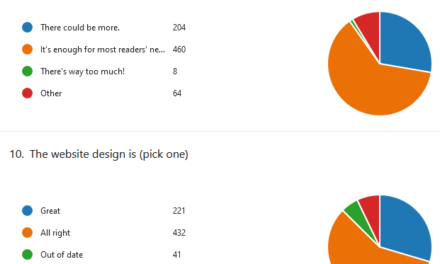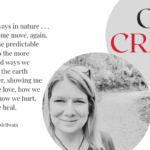
Editorial Assistant Emily Rose Cole: Next week thousands of writers will descend like a flight of fireflies on San Antonio for the Association of Writers and Writing Programs conference, to hold readings, connect with friends, and give panels, lectures, and keynote speeches.
For many writers the week before AWP is marked by a feeling of buzzy anticipation mixed with mild dread; for disabled writers, this pre-AWP anxiety is more complex. Many disabled writers use this week to look at floor plans, scoping out where the quiet room is, how many elevators or bathrooms there are, and how to access them. They plan their exact route between their lodgings and the convention center. They pack their meds, mobility aids, and other accommodative devices. They check and double-check that important hardware, like scooters, will be available every day.
In short, to be disabled at a conference means that the onus of preparedness is placed on the disabled individual, and only a culture committed to systemic change will begin to relieve this acute and particular anxiety. Here are a few ways that disabled and nondisabled folks alike can be a part of such a change, both at AWP and beyond.
- Think about the space in advance. A reading or lecture is only as accessible as the space it’s in. If you want to be inclusive at your reading, make sure to choose a space that is not only ADA compliant, but one that is easy for folks with mobility difficulties and other physical impairments to access. First-floor locations or locations with obvious elevator access are great options; a room above a bar accessible only by one narrow staircase is not. If you’re an organizer, show up early to assess any access difficulties you might encounter in the space (obscured sightlines, particular types of microphones, etc.) and think through how to handle them.
- Embrace video-call technology. It’s becoming blessedly more common for panelists at AWP to appear via video chat. When planning your panel or reading, invite disabled folks even if they can attend only via video chat. This requires that organizers think even more closely about the space and request AV technology in advance, but it’s one of the main ways to create access for folks who can’t travel due to disability.
- Write an access statement to read before your panel or reading. An access statement is a written document that introduces the speaker or panelists, and invites attendees to use the space in a way that is most comfortable, including getting up and sitting back down, stimming, taking notes, etc. If you’d like a template for such a statement, here is an excellent one by disability scholar Margaret Price. (Pro tip: It’s easy to merge an access statement and a land acknowledgement!)
- Print and distribute access copies. The AWP conference requires panelists to print at least five (and ideally more than five) access copies of your talk so folks that are d/Deaf, Hard of Hearing, have auditory processing disorders, etc. can engage meaningfully with your work. If you plan to speak extemporaneously, that’s okay, but include some bullet points regarding what you plan to discuss. This year AWP is implementing an “Outline” feature that allows folks to upload a presentation outline in addition to printed access copies. As someone who’s been both a panelist and a panel organizer, I encourage everyone to print their access copies in advance to minimize on-site issues.
- Use the microphone. Many nondisabled folks, especially those with loud voices, prefer not to use the microphone to create a more intimate feeling at a panel or a reading. However, if you don’t use the mic, you’re excluding d/Deaf or HOH folks from your panel. Make sure to repeat unmiked questions back before you answer them too.
- Give image descriptions and use closed captioning if you’re using AV technology in your panel. This makes all aspects of your presentation accessible to low-vision and d/Deaf and HOH folks.
- Don’t distract service animals. Service animals are adorable fluffs, but if they’re at a conference, they’re working. Ask the service animal’s owner before interacting. If you’re organizing a panel or a reading, make sure that the proprietors of the space are aware that service animals may be present, so folks with service animals don’t experience complications on arrival.
- Record and report access barriers. At a big conference like AWP, disabled (and even nondisabled) folks are liable to run into access barriers of some kind. If you see a barrier to access, take a picture or make a note, and report it to the conference staff or the reading organizer so they’re aware and can plan differently next time.
In order to create a more accessible world, we must all begin to change our thinking about the spaces we share. When planning an event, ask yourself whose bodies are excluded from this space and how you, as the organizer, could work to include them. Even seemingly small acts like using the mic when you don’t think you have to, reading an access statement, and including captions or image descriptions, can make a big difference to folks who are in the room.

Emily Rose Cole is the author of Love & a Loaded Gun, a chapbook of persona poems in the voices of mythological and historical women, published in 2017 Minerva Rising Press. She has received awards from Jabberwock Review, Philadelphia Stories, The Orison Anthology, and the Academy of American Poets. Her poetry has appeared or is forthcoming in American Life in Poetry, Best New Poets 2018, Carve, and River Styx, among others. She holds an MFA from Southern Illinois University Carbondale and is a PhD candidate in poetry with a focus in Disability Studies at the University of Cincinnati, where she is a Taft Fellow. Her website is www.emilyrosecolepoetry.com.











